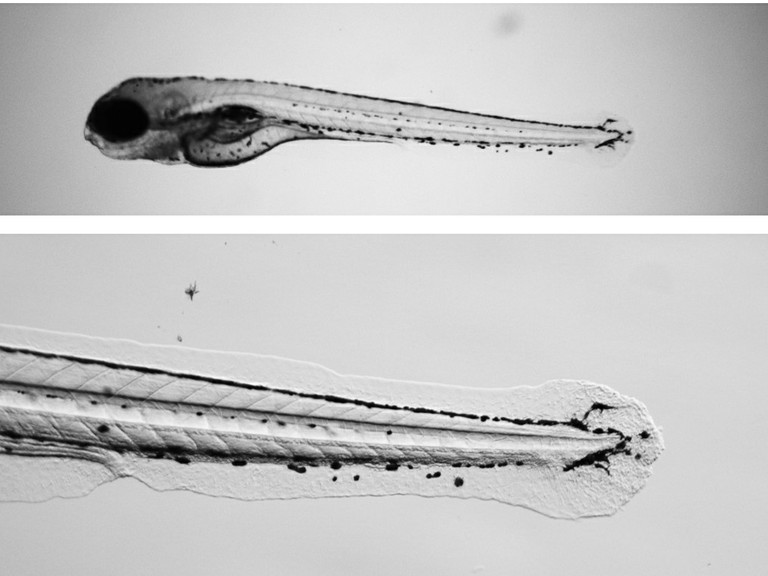New insights into our immune system
Bcl6 important for the formation of certain dendritic cells
Dendritic cells play an important role in setting the course of our immune system. However, what determines their heterogeneity and functional specialization is still not sufficiently understood. An international collaboration consisting of researchers from the University Hospital Bonn (UKB), the University of Bonn and the Technical University of Denmark, among others, has investigated the role of the transcription factor Bcl6 in dendritic cells in a mouse model and discovered that a subgroup is highly dependent on this protein. The findings contribute to a better understanding of immunological processes during infections, vaccinations, allergies and autoimmunity. The results have now been published in the renowned scientific journal “Nature Communications”.
Dendritic cells are part of our innate immune system and occupy a central position there. “These cells are particularly good at initiating an effective T-cell-mediated immune response of the acquired immune system,” explains co-corresponding author Prof. Dirk Baumjohann from the Medical Clinic III for Hematology, Oncology, Immuno-Oncology and Rheumatology at the UKB, who is a member of the Cluster of Excellence ImmunoSensation2 and the Transdisciplinary Research Area (TRA) “Life & Health” at the University of Bonn. “However, it is still unclear what exactly drives their heterogeneity and functional specialization.” Previous studies have investigated the function of the protein Bcl6 in dendritic cells – in some cases with varying results. The aim of the current study is to harmonize the sometimes contradictory data using an in-depth analysis.
The researchers therefore used a mouse model to investigate how the absence of Bcl6 affects all dendritic cell subgroups. “We found that in particular one specific dendritic cell subgroup (cDC2) is highly dependent on Bcl6,” explains Prof. Katharina Lahl, who led the project at the Technical University of Denmark and is now continuing her work in Calgary. “Bcl6 deficiency leads to a lack of a dendritic cell subpopulation and results in impaired antibody responses in the spleen.” As a result, the animals showed weakened immune responses in infection and vaccination models. […]
Participating Core Facilities: The authors acknowledge the support from the Flow Cytometry Core Facility.
Participating institutions and funding:
Section for Experimental and Translational Immunology, Institute for Health Technology, Technical University of Denmark (DTU), 2800, Kongens, Lyngby, Denmark
Medical Clinic III for Oncology, Hematology, Immuno-Oncology and Rheumatology, University Hospital Bonn, University of Bonn, Bonn, Germany
Institute for Immunology, Biomedical Center, Faculty of Medicine, LMU Munich, Planegg-Martinsried, Munich, Germany
Biomedical Center, Institute of Cardiovascular Physiology and Pathophysiology, Faculty of Medicine, Ludwig-Maximillians-Universität München, Planegg-Martinsried, Munich, Germany
Walter-Brendel-Centre of Experimental Medicine, University Hospital, LMU Munich, Planegg-Martinsried, Munich, Germany
Cell Reprogramming in Hematopoiesis and Immunity Laboratory, Lund Stem Cell Center, Molecular Medicine and Gene Therapy, Lund University, Lund, Sweden
Wallenberg Center for Molecular Medicine, Lund University, Lund, Sweden
Department of Microbiology, Immunology, and Infectious Diseases, Cumming School of Medicine, University of Calgary, Calgary, Alberta, Canada
Calvin, Phoebe and Joan Snyder Institute for Chronic Diseases, University of Calgary, Calgary, Alberta, Canada
Quantitative Systems Biology, Life and Medical Sciences (LIMES) Institute, University of Bonn, Bonn, Germany
Center for Neuroscience and Cell Biology, University of Coimbra, Coimbra, Portugal
Immunology Section, Lund University, Lund, Sweden
Funding for this project was provided by the China Scholarship Council fellowship, the Lundbeck Foundation Fellowship, the Ragnar Söderberg Foundation Fellowship in Medicine, Vetenskapsrådet, Cancerfonden, the Novo Nordisk Foundation, the Crafoord Foundation, the European Research Council, Deutsche Forschungsgemeinschaft (DFG, German Research Foundation) Emmy Noether grant, Deutsche Forschungsgemeinschaft (DFG, German Research Foundation) Emmy Noether Program, and Germany’s Excellence Strategy.
Publication: H. Xiao et al: Genomic deletion of Bcl6 differentially affects conventional dendritic cell subsets and compromises Tfh/Tfr/Th17 cell responses; Nature Communications; DOI: 10.1038/s41467-024-46966-6







